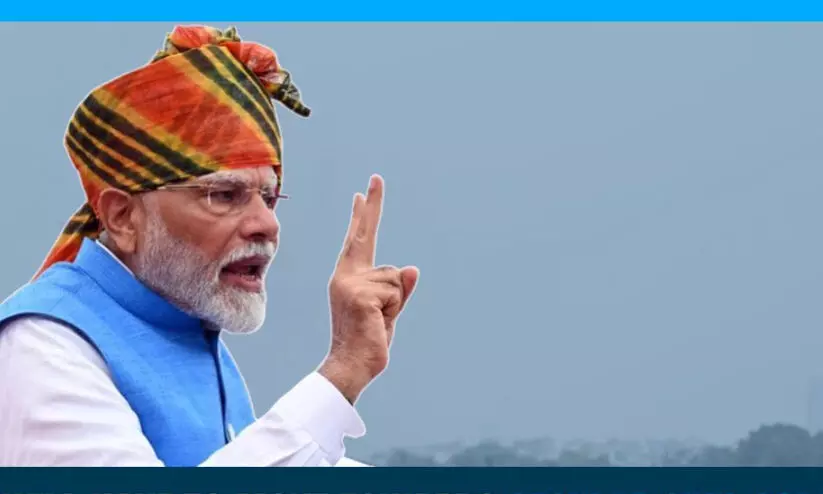
Modi's 'Hindutva Code' wrapped in 'Secular Code' sparks scepticism
text_fieldsReligious minorities, particularly Muslims, under the Modi regime, are constantly facing various threats to their religious practices, a freedom guaranteed by the Constitution, which the government is indiscreetly intervening in with the aim of decimating them to ensure Hindutva dominance.
Ever since Modi ascended to power, the regime appears to have been focused on overpowering the Muslim community in the country, aiming to satisfy the demands of extremist elements within the right-wing fold rather than addressing the country’s key issues. Various instances of this divisive agenda were invoked and imposed on the Muslim community during the BJP’s previous term, but the most crucial challenges may be yet to come.
After introducing amendments to the Waqf Act, Prime Minister Narendra Modi hinted at another divisive ploy by the government: the uniform civil code, disguised under the silky cover of a 'secular code,' as mentioned in his Independence Day speech.
The proposal, intended to replace what Modi described as the current "communal civil code," has been met with strong criticism from political, religious, and civil society leaders, who question the sincerity of the government's commitment to true secularism.
Modi's choice of the term "secular civil code" rather than the more commonly used "uniform civil code" has drawn particular attention. Critics suggest that this shift in terminology is a deliberate attempt to reframe the contentious issue, potentially to broaden its appeal and to appear living upto a basic tenet of the Constitution - which used to be an ignored if not shunned feature for the Hindutva vamp
The timing of Modi's remarks, coming just ahead of crucial state elections, has further fuelled suspicions of political motivations behind the proposal. Many fear that the Prime Minister's statements could polarise the electorate along religious lines.
Civil society and political reactions
The reactions from civil society have been overwhelmingly sceptical. Concerns have been raised about the government's intentions and the impact of such a proposal on India's diverse communities. Critics argue that despite the use of the word "secular," the proposal may still reflect a sectarian agenda.
Some view the change in terminology as a tactical move to deflect criticism from groups that have historically opposed the idea of a uniform civil code, particularly among Muslims, tribal groups, and Sikhs.
Political leaders across the spectrum have also voiced their objections. The opposition has pointed to the Prime Minister's track record of controversial statements, questioning the sincerity of his commitment to secularism. The timing of the announcement has been criticised, with suggestions that it is aimed at influencing the upcoming state elections. Some leaders have expressed concerns that the proposal could further alienate religious minorities, who may view it as an attempt to impose a majoritarian agenda.
Religious opposition and legal concerns
The All India Muslim Personal Law Board (AIMPLB) was among the first to reject the proposal, issuing a strongly worded statement that labelled it as "highly objectionable." The AIMPLB argued that the proposal to replace religious personal laws with a secular civil code is an affront to religious communities, particularly Muslims, who see it as an attack on Sharia Law.
The Board also emphasised the constitutional protections for religious practices, highlighting that the Shariat Application Act of 1937 and Article 25 of the Indian Constitution enshrine the right to profess, propagate, and practice religion.
Legal experts have also weighed in on the constitutional implications of the Prime Minister’s remarks. While the Directive Principles of State Policy in the Indian Constitution mention a Uniform Civil Code, these principles are not enforceable by courts and cannot supersede the fundamental rights enshrined in the Constitution.
The concerns raised point to the potential impact on India's federal structure and pluralistic society, with some arguing that the right to practice one’s religion and maintain one’s culture is a fundamental aspect of India’s constitutional framework.
The proposal has also sparked reactions from regional parties and minority groups. Leaders from the southern states, where there is a strong emphasis on maintaining cultural and religious diversity, have voiced strong opposition. There is a growing fear that the proposal could undermine the spirit of unity in diversity, which is a cornerstone of India's national identity.






















